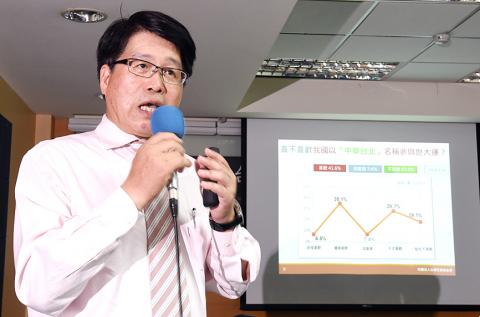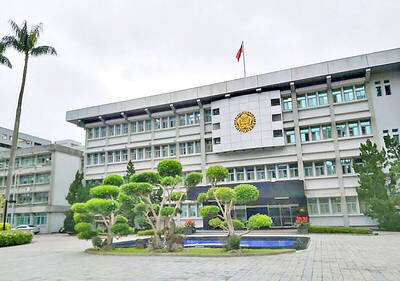President Tsai Ing-wen’s (蔡英文) approval rating has dropped to below 30 percent, the lowest of her presidency, while Taipei Mayor Ko Wen-je (柯文哲) has an approval rating of about 70 percent nationwide, one of the highest for any politician in the nation’s history, according to a monthly poll by the Taiwanese Public Opinion Foundation released yesterday.
Tsai’s approval rating has fallen to 29.8 percent, the lowest since the foundation began tracking her popularity in May last year, with 50 percent of respondents saying they are unsatisfied with the way she leads the government, the third-highest dissatisfaction rate since she took office.
The approval rating of Premier Lin Chuan’s (林全) Cabinet was 28.7 percent, with 59.7 percent of respondents dissatisfied with the Executive Yuan’s performance.

Photo: Liu Hsin-de, Taipei Times
Fifty-four percent of respondents said they were satisfied with pension reform, while 34.6 percent said they were not.
The poll found that 45.3 percent of respondents disapproved of the Forward-looking Infrastructure Development Program, while 38.9 percent supported it.
According to the survey, 57.5 percent of respondents were unsatisfied with judicial reform, while 28.7 percent expressed satisfaction.
The reasons behind the Tsai administration’s flagging approval rating are ineffective economic policies, the cross-strait deadlock, poor Cabinet performance, the fallout from a set of controversial bills, including a labor law amendment, a draft same-sex marriage legislation and the infrastructure program, foundation chairman You Ying-lung (游盈隆) said.
A major Cabinet reshuffle could boost the government’s approval rating in the short term, but Tsai is apparently unwilling to order a reshuffle, You said.
The poll found that 68.5 percent of respondents approved of Ko, while 25 percent said they did not.
Ko has higher support among younger and higher-educated people — 87.3 percent of people aged 20 to 24 and 82.3 percent of respondents with a college degree — and his popularity extends to other municipalities, according to the poll.
“Ko’s popularity outside Taipei suggests an overwhelming dissatisfaction with the Democratic Progressive Party [DPP] administration and the two major parties,” New Power Party Legislator Hsu Yung-ming (徐永明) said.
“The nearly 70 percent support rate is a political asset craved by every politician. In the history of Taiwan, only one person had a similar level of popularity: [People First Party Chairman] James Soong (宋楚瑜),” You said.
“The non-partisan support suggests that Ko is no longer an inexperienced politician, but a ‘Godzilla,’ due to his disruptive [politics] and popular status,” You said.
When asked if they thought Ko could successfully manage the Summer Universiade, which begins on Saturday, 65.9 percent of respondents said they had confidence in Ko, while 24.7 percent said they were not confident.
Sixty-three percent of respondents said the games are an important event for them, while 32.1 percent said they did not care about the Universiade.
When asked if they support the government holding large international sports events that cost billions of New Taiwan dollars, 63.7 percent of respondents expressed support, while 30.3 percent expressed disapproval.
The poll also found a decline in the percentage of people identifying themselves as “Taiwanese,” while the number of people who identified as “Chinese” increased.
Seventy-two percent of respondents identified themselves as Taiwanese, 10.6 percent as Chinese and 12.1 percent as both Taiwanese and Chinese, according to the poll.
Compared with the foundation’s survey in May last year, the percentage of respondents identifying themselves as Taiwanese fell by 8.8 percentage points, the percentage of those who adopt double identification rose by 4.5 percentage points and the percentage of those who identify as Chinese rose by 2.5 percentage points.
The poll found that 78.2 percent of respondents were proud of being Taiwanese, while 6.3 percent said they were not.
According to the poll, 47.8 percent of respondents said they do not like the name “Chinese Taipei,” which the nation’s sports teams use at international events, while 41.6 percent said they like it.
Taipei National University of the Arts professor Chyi-Wen Yang (楊其文) said the decrease in Taiwanese identity is caused by Beijing’s “united front” tactics coupled with public disappointment with the democratic development under the DPP administration.
Hsu said that Tsai was elected on the public’s aversion to former president Ma Ying-jeou’s (馬英九) pro-China stance, but she has done little to affirm Taiwanese sovereignty and identity or institutionalize a cross-strait negotiation mechanism, which might have caused a drop in Taiwanese identification.
The survey, conducted on Monday and Tuesday last week, collected 1,074 valid samples and has a margin of error of 2.99 percentage points.

The German city of Hamburg on Oct. 14 named a bridge “Kaohsiung-Brucke” after the Taiwanese city of Kaohsiung. The footbridge, formerly known as F566, is to the east of the Speicherstadt, the world’s largest warehouse district, and connects the Dar-es-Salaam-Platz to the Brooktorpromenade near the Port of Hamburg on the Elbe River. Timo Fischer, a Free Democratic Party member of the Hamburg-Mitte District Assembly, in May last year proposed the name change with support from members of the Social Democratic Party and the Christian Democratic Union. Kaohsiung and Hamburg in 1999 inked a sister city agreement, but despite more than a quarter-century of

The Ministry of Foreign Affairs (MOFA) yesterday expressed “grave concerns” after Singaporean Prime Minister Lawrence Wong (黃循財) reiterated the city-state’s opposition to “Taiwanese independence” during a meeting with Chinese Premier Li Qiang (李強). In Singapore on Saturday, Wong and Li discussed cross-strait developments, the Singaporean Ministry of Foreign Affairs said in a statement. “Prime Minister Wong reiterated that Singapore has a clear and consistent ‘one China’ policy and is opposed to Taiwan independence,” it said. MOFA responded that it is an objective fact and a common understanding shared by many that the Republic of China (ROC) is an independent, sovereign nation, with world-leading

Temperatures in northern Taiwan are forecast to reach as high as 30°C today, as an ongoing northeasterly seasonal wind system weakens, the Central Weather Administration (CWA) said. CWA forecaster Tseng Chao-cheng (曾昭誠) said yesterday that with the seasonal wind system weakening, warmer easterly winds would boost the temperature today. Daytime temperatures in northern Taiwan and Yilan County are expected to range from 28°C to 30°C today, up about 3°C from yesterday, Tseng said. According to the CWA, temperature highs in central and southern Taiwan could stay stable. However, the weather is expected to turn cooler starting tonight as the northeasterly wind system strengthens again

The Ministry of Justice Investigation Bureau (MJIB) has been investigating nine shell companies working with Prince Holding Group, and the Taipei District Prosecutors’ Office is seeking further prosecution of alleged criminals, a source said yesterday. The nine companies and three Taiwanese nationals were named by the US Department of the Treasury’s Office of Foreign Assets Control (OFAC) on Oct. 14 as Specially Designated Nationals as a result of a US federal court indictment. Prince Holding founder Chen Zhi (陳志) has been charged with fraud, conspiracy, money laundering and overseeing Prince Holding’s suspected forced-labor camps in Cambodia, the indictment says. Intelligence shared between Taiwan,